Hypotonic fluids - Study guides, Class notes & Summaries
Looking for the best study guides, study notes and summaries about Hypotonic fluids? On this page you'll find 2758 study documents about Hypotonic fluids.
Page 4 out of 2.758 results
Sort by

-
NCLEX RN- Physiological Integrity Questions and 100% Correct Answers | Grade A+
- Exam (elaborations) • 42 pages • 2024
- Available in package deal
-
- $14.99
- + learn more
Tonicity Ans: Concentration of a substance dissolved in water Isotonic fluids Ans: Same concentration as body fluids (0.9% NaCl, Ringer's Solution, Lactated Ringer's, 5% Dextrose in water) Hypertonic solution Ans: Solute concentration greater than that of body fluids (10-15% Dextrose in water, 3% NaCl, Sodium Bicarbonate 5%) Hypotonic solution Ans: Solute concentration less than that of body fluids (0.45% NaCl) ECF Ans: Extracellular fluid Every 72 hours Ans: How often is standa...
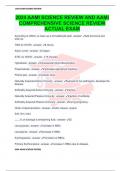
-
2024 AAMI SCIENCE REVIEW AND AAMI COMPREHENSIVE SCIENCE REVIEW ACTUAL EXAM
- Exam (elaborations) • 10 pages • 2024
-
- $13.49
- + learn more
According to OSHA, to clean up a formaldehyde spill: -answer- Add ammonia and wipe up. TWA for HCHO: -answer- 8 Hours. Action Level: -answer- 0.5ppm. STEL for HCHO: -answer- 15 minutes. Hypostasis: -answer- Intravascular blood discoloration. Preservatives: -answer- Inactivates saprophytic bacteria. Phenol aka: -answer- Carbolic Acid. Naturally Acquired Active Immunity: -answer- Exposed to live pathogens, develops the disease. Artificially Acquired Active Immunity: -answer...
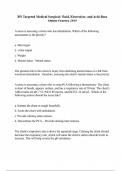
-
RN Targeted Medical Surgical: Fluid, Electrolyte, and Acid-Base Online Practice 2019
- Exam (elaborations) • 15 pages • 2024
-
- $10.00
- + learn more
A nurse is assessing a client who has dehydration. Which of the following assessments is the priority? a. Skin turgor b. Urine output c. Weight d. Mental status - Mental status The greatest risk to this client is injury from declining mental status or a fall from worsened dehydration. Therefore, assessing the client's mental status is the priority. A nurse is assessing a client who is using PCA following a thoracotomy. The client is short of breath, appears restless, and has a respiratory...
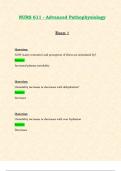
-
NURS 611 / NURS611 Exam 1 (Latest 2024 / 2025 Update): Advanced Pathophysiology | Complete Guide with Questions and Verified Answers | 100% Correct | Grade A - Maryville
- Exam (elaborations) • 43 pages • 2024
- Available in package deal
-
- $7.99
- + learn more
Exam 1: NURS611 / NURS 611 (Latest 2024 / 2025 Update) Advanced Pathophysiology Exam Review | Complete Guide with Questions and Verified Answers | 100% Correct | Grade A - Maryville Q: ADH (water retention) and perception of thirst are stimulated by? Answer: Increased plasma osmolality Q: Osmolality increases or decreases with dehydration? Answer: Increases Q: Osmolality increases or decreases with over hydration Answer: Decreases Q: What is a normal sodium level? Answer: 135-145 meq/l Q: Sodium...
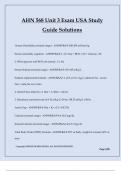
-
AHN 568 Unit 3 Exam USA Study Guide Solutions
- Exam (elaborations) • 26 pages • 2024
-
- $12.49
- + learn more
AHN 568 Unit 3 Exam USA Study Guide Solutions Serum Osmolality (normal range) - ANSWER-280-295 mOsm/kg Serum osmolality equation - ANSWER-1. (2 x Na) + BUN /2.8 + Glucose /18 2. When glucose and BUN are normal : 2 x Na Serum Sodium (normal range) - ANSWER-135-145 mEq/L Sodium replacement formula - ANSWER-1. (0.5 or 0.6 x kg) x (desired Na - serum Na) = mEq Na over 4 hrs 2. Need/Have mEq Na x 1 liter = L/4hrs = ml/hr 3. Maximum correction rate is 8-12 mEq/L/24 hr. OR 25 mEq/L/48 hr. Ani...
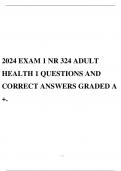
-
2024 EXAM 1 NR 324 ADULT HEALTH 1 QUESTIONS AND CORRECT ANSWERS GRADED A +.
- Exam (elaborations) • 54 pages • 2024
-
- $13.49
- + learn more
2024 EXAM 1 NR 324 ADULT HEALTH 1 QUESTIONS AND CORRECT ANSWERS GRADED A +. 2 / 37 1. What age group has the highest percentage of water content?: Preterm /Neonates 2. Two fluid compartments in the body: Intracellular space (inside cells) locatedin the ICF Extracellular space (outside cells) located in the ECF 3. ICF makes up what percent of total body weight?: 40% 4. What are the twomain compartments containingECF?What other compart-ments are there?: Interstitial fluid (fluid in the s...
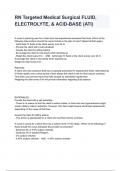
-
RN Targeted Medical Surgical FLUID, ELECTROLYTE, & ACID-BASE (ATI)
- Exam (elaborations) • 20 pages • 2024
-
- $12.99
- + learn more
RN Targeted Medical Surgical FLUID, ELECTROLYTE, & ACID-BASE (ATI) A nurse is planning care for a client who has experienced excessive fluid loss. Which of the following interventions should the nurse include in the plan of care? (Select all that apply.) - Administer IV fluids to the client evenly over 24 hr. - Provide the client with a salt substitute - Assess the client for pitting edema - Encourage the client to rise slowly when standing up - Weigh the client every 8 hr. - ANS Adm...
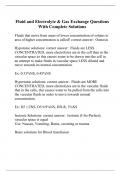
-
Fluid and Electrolyte & Gas Exchange Questions With Complete Solutions
- Exam (elaborations) • 46 pages • 2023
-
- $15.99
- + learn more
Fluids that move from areas of lower concentration of solutes to area of higher concentration is called? correct answer: Osmosis Hypotonic solutions: correct answer: Fluids are LESS CONCENTRATED, more electrolytes are in the cell than in the vascular space so this causes water to be drawn into the cell in an attempt to make fluids in vascular space LESS diluted and move towards its normal concentration. Ex: 0.33%NS, 0.45%NS Hypertonic solutions: correct answer: Fluids are MORE CONCEN...
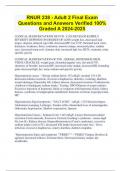
-
RNUR 238 - Adult 2 Final Exam Questions and Answers Verified 100% Graded A 2024-2025
- Exam (elaborations) • 31 pages • 2024
-
- $16.99
- + learn more
CLINICAL MANIFESTATIONS OF FVD - CAN DEVELOP RAPIDLY SEVERITY DEPENDS ON DEGREE OF LOSS weight loss, decreased skin turgor, oliguria, delayed cap refill, decreased BP, low CVP, flattened neck veins, dizziness, weakness, thirst, confusion, muscle cramps, increased pulse, sunken eyes, increased temp cool, clammy skin, increased hgb, hct, BUN, creatnine, urine specific gravity CLINICAL MANIFESTATION OF FVE - EDEMA, DISTENDED NECK VEINS, CRACKLES, weight gain, distended jugular vein, elevated CVP...
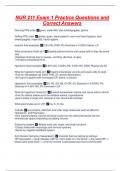
-
NUR 211 Exam 1 Practice Questions and Correct Answers
- Exam (elaborations) • 25 pages • 2024
-
Available in package deal
-
- $11.99
- + learn more
Donning PPE order gown, mask/n95, face shield/goggles, gloves Doffing PPE order gloves, gown, leave patient's room and hand hygiene, face shield/goggles, mask/n95, hand hygiene Isotonic fluid examples 0.9% NS, D5W, 5% Dextrose in 0.225% Saline, LR What do isotonic fluids do? Expand plasma volume and cause cells to stay the same size -Replaces fluid lost due to nausea, vomiting, diarrhea, surgery -increases extracellular fluid Hypotonic fluid examples 0.45% NS, 0.225% NS, 0.33% NS, D5W, Plas...

How much did you already spend on Stuvia? Imagine there are plenty more of you out there paying for study notes, but this time YOU are the seller. Ka-ching! Discover all about earning on Stuvia


